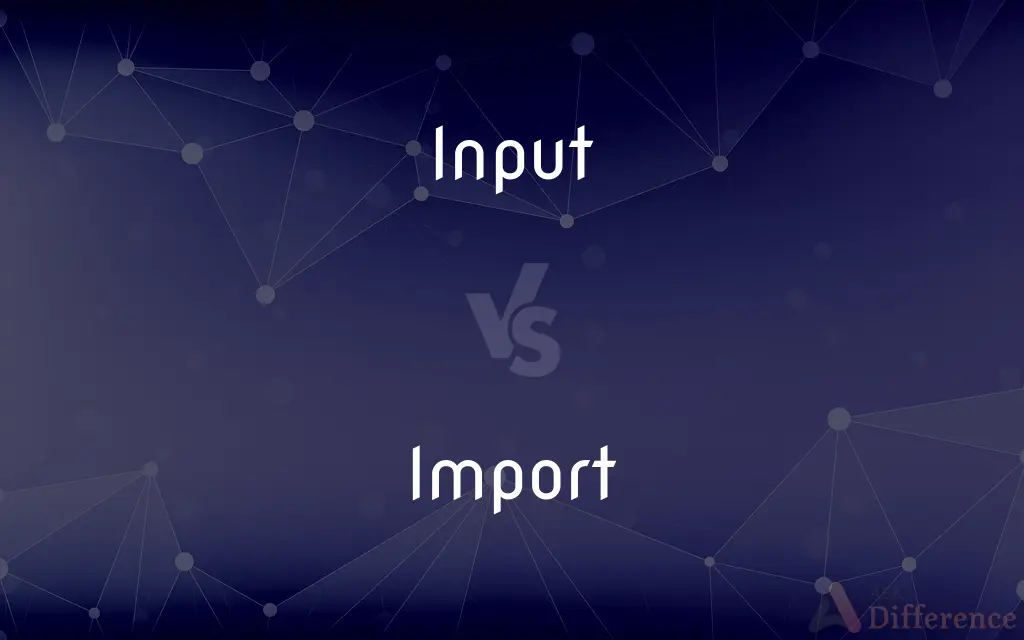Input vs. Import — What's the Difference?
By Tayyaba Rehman & Fiza Rafique — Updated on March 8, 2024
Input refers to data entered into a system, while import is bringing data into one software from another.

Difference Between Input and Import
Table of Contents
ADVERTISEMENT
Key Differences
Input and import are terms frequently used in the context of data and computing, but they serve different purposes. Input involves entering data or information into a computer system or application manually by the user or automatically via devices. This can include typing text, clicking a mouse, or using voice commands. Import, on the other hand, involves transferring data from one software application or system to another. This process often requires the data to be in a compatible format and is used to integrate or consolidate information from various sources.
While input is a broad term that can apply to any data or commands entered into a system, import is more specific and implies a transfer of data between different software systems or applications. For example, inputting data might mean adding a new entry into a database manually, whereas importing could involve bringing an entire spreadsheet of data into the database from another program.
The method of input can vary widely, from simple text entry on a keyboard to complex automated data feeds from sensors or other devices. Importing data, however, usually follows specific procedures or uses tools designed to map data from the source format to the destination format, ensuring that the information is correctly integrated into the new system.
Input is essential for the basic operation of any computer system, allowing users to provide the necessary information for processing and interaction. Importing is crucial for data management, enabling the consolidation, analysis, and reporting of information gathered from multiple sources, enhancing decision-making processes.
In terms of usability, input functionality is integral to the design of interfaces, focusing on user experience and the efficient entry of data. Import functionality, however, often deals with compatibility and the technical aspects of data translation and integration, requiring a deeper understanding of data formats and structures.
ADVERTISEMENT
Comparison Chart
Definition
Data entered into a system.
Bringing data into one software from another.
Purpose
To provide information for processing.
To integrate or consolidate information.
Method
Manual or automatic entry.
Transfer between software systems.
Scope
Broad, applies to any data entry.
Specific, involves data transfer.
Usability Focus
User experience and data entry efficiency.
Compatibility and technical integration.
Compare with Definitions
Input
Essential for interaction with software applications.
Inputting a query in a search engine.
Import
Enhances productivity by integrating external data.
Importing a calendar file to sync with a personal scheduler.
Input
Varied in form.including text.voice commands.and clicks.
Using voice input to control smart home devices.
Import
Transferring data from one application to another.
Importing contacts from an email account into a CRM system.
Input
Can be manual.like keyboard entry.or automatic.
Sensor data feeding into a monitoring system.
Import
Involves technical procedures or tools for data mapping.
Using an import wizard to transfer database records.
Input
Affects the design of user interfaces.emphasizing ease of use.
Touchscreen input for smartphones.
Import
Facilitates data consolidation and analysis.
Importing sales data into analytics software.
Input
Entering data into a computer system.
Typing a report in a word processor.
Import
Requires compatibility between source and destination formats.
Importing a CSV file into a spreadsheet application.
Input
What is put in, taken in, or operated on by any process or system
There is little input from other members of the team
Data input
Import
An import in the receiving country is an export from the sending country. Importation and exportation are the defining financial transactions of international trade.In international trade, the importation and exportation of goods are limited by import quotas and mandates from the customs authority.
Input
A place where, or a device through which, energy or information enters a system
The signal being fed through the main input
Import
To bring or carry in from an outside source, especially to bring in (goods or materials) from a foreign country for trade or sale.
Input
Put (data) into a computer
Test results can be inputted by the technician in the laboratory
Import
(Computers) To receive (data) into one program from another.
Input
Energy, work, or power used to drive a machine.
Import
To carry or hold the meaning of; signify
Had trouble understanding what the strange word imported.
Input
Current, electromotive force, or power supplied to an electric circuit, network, or device.
Import
To express or make known
The news imported by their letter.
Input
Information put into a communications system for transmission or into a computer system for processing.
Import
To betoken or indicate
A high inflation rate importing hard times for the consumer.
Input
Any of the items, including materials, equipment, and funds, required for production.
Import
Something imported
Levied a tax on imports from overseas.
Input
The act of putting in; infusion
A steady input of fuel.
Import
The act or occupation of importing goods or materials.
Input
An amount put in.
Import
Meaning; signification
The import of his statement is ambiguous.
Input
Contribution of information or a comment or viewpoint
A discussion with input from all members of the group.
Import
Importance; significance
A legal decision of far-reaching import.
Input
To enter (data or a program) into a computer.
Import
(countable) Something brought in from an exterior source, especially for sale or trade.
Input
The act or process of putting in; infusion.
Import
(uncountable) The practice of importing.
Input
That which is put in, as in an amount.
Import
(uncountable) Significance, importance.
It was a matter of great import.
Input
Contribution of work or information, as an opinion or advice.
You can provide input via this form.
Import
A foreigner playing in a sports league.
Input
Data fed into a process with the intention of it shaping or affecting the output of that process.
Sound input
Import
(transitive) To bring (something) in from a foreign country, especially for sale or trade.
Input
(electronics) An input jack.
Model with A/V input
Import
(transitive) To load a file into a software application from another version or system.
How can I import files from older versions of this application?
Input
(transitive) To put in; put on.
Import
(intransitive) To be important; to be significant; to be of consequence.
Input
(transitive) To enter data.
The user inputs his date of birth and the computer displays his age.
Import
(transitive) To be of importance to (someone or something).
Input
(transitive) To accept data that is entered.
Import
(transitive) To be incumbent on (someone to do something).
Input
Signal going into an electronic system
Import
(transitive) To be important or crucial to (that something happen).
Input
Any stimulating information or event; acts to arouse action
Import
(transitive) To mean, signify.
Input
Enter (data or a program) into a computer
Import
To express, to imply.
Import
To bring in from abroad; to introduce from without; especially, to bring (wares or merchandise) into a place or country from a foreign country, in the transactions of commerce; - opposed to export. We import teas from China, coffee from Brazil, etc.
Import
To carry or include, as meaning or intention; to imply; to signify.
Every petition . . . doth . . . always import a multitude of speakers together.
Import
To be of importance or consequence to; to have a bearing on; to concern.
I have a motion much imports your good.
If I endure it, what imports it you?
Import
To signify; to purport; to be of moment.
Import
Merchandise imported, or brought into a country from without its boundaries; - generally in the plural, opposed to exports.
I take the imports from, and not the exports to, these conquests, as the measure of these advantages which we derived from them.
Import
That which a word, phrase, or document contains as its signification or intention or interpretation of a word, action, event, and the like.
Import
Importance; weight; consequence.
Most serious design, and the great import.
Import
Commodities (goods or services) bought from a foreign country
Import
An imported person brought from a foreign country;
The lead role was played by an import from Sweden
They are descendants of indentured importees
Import
The message that is intended or expressed or signified;
What is the meaning of this sentence
The significance of a red traffic light
The signification of Chinese characters
The import of his announcement was ambigtuous
Import
A meaning that is not expressly stated but can be inferred;
The significance of his remark became clear only later
The expectation was spread both by word and by implication
Import
Having important effects or influence;
Decisions of great consequence are made by the president himself
Virtue is of more moment that security
Import
Bring in from abroad
Import
Indicate or signify;
I'm afraid this spells trouble!
Common Curiosities
Why is data format important for importing?
Data format is crucial because it must be compatible with the destination system to ensure accurate integration and functionality.
How do input and import affect data management?
Input is fundamental for adding new data, while import is key for consolidating and utilizing data from various sources, both critical for effective data management.
How do input and import functionalities impact software design?
They necessitate designing intuitive interfaces for user input and robust back-end systems for importing, focusing on user experience and technical efficiency, respectively.
What challenges might arise during the import process?
Challenges include data format mismatches, loss of data fidelity, and integration issues with the destination system.
What is the main difference between input and import?
Input is about entering data into a system, while import involves transferring data from one software to another.
Can import be considered a type of input?
In a broad sense, yes, since importing data introduces new information into a system, but it specifically refers to data transfer between software.
Can automated systems both input and import data?
Yes, automated systems can perform both actions: they can input data directly into systems and import data from external sources, depending on their configuration.
Is user intervention always required for input and import?
Input can be automated or manual, and import may require initial setup but can often be automated for routine data transfers.
How do developments in technology affect input and import methods?
Advances in technology offer new input methods (e.g., voice recognition) and streamline import processes (e.g., cloud-based data integration).
Can the quality of input and import processes affect the outcome of data analysis?
Yes, the accuracy and integrity of both input and imported data are crucial for reliable analysis and decision-making.
Share Your Discovery

Previous Comparison
Crazy vs. Loco
Next Comparison
Waped vs. WawedAuthor Spotlight
Written by
Tayyaba RehmanTayyaba Rehman is a distinguished writer, currently serving as a primary contributor to askdifference.com. As a researcher in semantics and etymology, Tayyaba's passion for the complexity of languages and their distinctions has found a perfect home on the platform. Tayyaba delves into the intricacies of language, distinguishing between commonly confused words and phrases, thereby providing clarity for readers worldwide.
Co-written by
Fiza RafiqueFiza Rafique is a skilled content writer at AskDifference.com, where she meticulously refines and enhances written pieces. Drawing from her vast editorial expertise, Fiza ensures clarity, accuracy, and precision in every article. Passionate about language, she continually seeks to elevate the quality of content for readers worldwide.















































